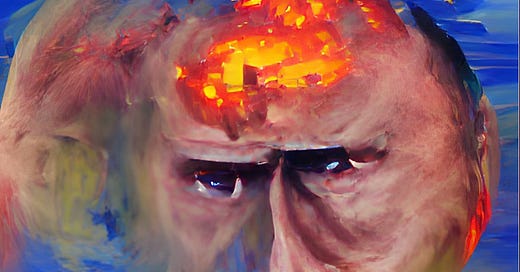We don’t focus enough, I suspect, on the pleasure of doing evil. We don't recognize the pull toward wickedness, cruelty and villainy, generally, as an important, seductive force operating through human history and in human affairs. I am considering this now in relationship to Putin, in particular, as his villainy is most overtly on display at the moment.
Of course, by exploring this, I don’t mean to condone it. I believe we need to reckon with it for our own survival, particularly in this age of exponential technology. This requires illuminating the reality of evil and bringing it into consciousness. This means returning to philosophers who explore amorality and evil as such, like Nietzsche, Bataille, and Sade. The guilt-plagued “civil religion” of Woke-ism — or liberalism, or identity politics — won’t help us here.
As we consider Putin—his war on Ukraine and his sudden, diabolical turn from authoritarian kleptocrat to totalitarian dictator—and as we contemplate Trump—the Teflon con man who may become President again — along with the scheming, cynical GOP backing him; as we study the secret machinations of the Neoliberal Great Reset crowd devising future technocratic controls; it becomes obvious that we need to get more of a handle on this inveterate, inescapable tendency: The magnetic attraction of villainy.
Those who don’t consciously feel any inclination toward evil or cruelty for its own sake, having suppressed this impulse within themselves, find it difficult to grasp the motives and the inner world of those who do. It needs to be clearly stated: Some people choose to inflict harm — seek to maximize the pain and destruction they inflict onto others — just because they can.
They don’t pursue villainy out of insecurity or unconscious projection. They do it because they enjoy it. Of course, they usually have justifications and rationalizations for it (except in the most extreme Ted Bundy-ish cases). Of course, one can always point to past traumas or genetic flaws that lead to the perpetuation of violence and wrongdoing, but sometimes that only obscures the reality.
Villains will continue their wickedness and cruelty as long as they get away with it. They will keep upping the stakes because they get off on it. The pleasure they receive from cheating the system or inflicting harm is psychologically addictive. Like all addictions, it requires bigger hits over time to get the same dopamine release.
Theorists of evil distinguish between foolish evil (caused by mistakes), natural evil (disasters etc), ideological evil (harm that occurs as a result of a mission, as collateral damage) and diabolic evil (done intentionally to hurt, with no other value). Many evil acts, such as Putin’s, involve an ambiguous mixture of several of these. Part of the thrill of conscious villainy is knowing that what you are doing is awful, horrific, contemptible, yet still continuing to do it.
Diabolic evil is a kind of rebellious, existential act against morality, order, divinity, hope.
All of us have the potential for evil — crime, cruelty, mayhem — inside of us, whether it comes out overtly or hides in our secret recesses. The human being is capacious and human nature is inherently formless, able to mold itself into any shape.
The difficult, perhaps unresolvable, problem we confront today is the collective failure to reckon with the shadow aspects of human psychology. Even as we develop increasingly reckless, hyper-destructive, potentially world-ending technologies, our legacy institutions concentrate enormous power in the hands of individuals who succeeded in rising through hierarchical structures exactly because of their psychopathic traits and narrowed focus.
I have often thought this: Most people—the masses and multitudes—are indoctrinated from an early ago to misdirect their amoral or “evil” tendencies in a perverse, self-defeating way. They learn to point this energy inwards, where it becomes an internally repressive force (Nietzsche talks about this as ressentiment or “bad conscience”). People commit a constant low-level violence against themselves by suppressing their malevolent instincts — because, along with natural amoral impulses, they forfeit their creative powers. (I am currently reading my old friend Carolyn Elliott’s Existential Kink, which makes these points and proposes practices for alchemizing our darker shadows).
This is the reason that many people don’t just become reluctant conformists: They become, instead, super-enthusiastic conformists. They draw the energy they use to throttle their own potential for individuation from their inherent amoral and evil tendencies, but they point it inward, controlling and taming themselves (Freud’s Super Ego). We possess a surplus of psychic energy. That same amoral energy can be channeled—creatively, productively—to bring about our transformation and self-actualization. Or we can use it to suppress ourselves.
Keep reading with a 7-day free trial
Subscribe to Liminal News With Daniel Pinchbeck to keep reading this post and get 7 days of free access to the full post archives.





